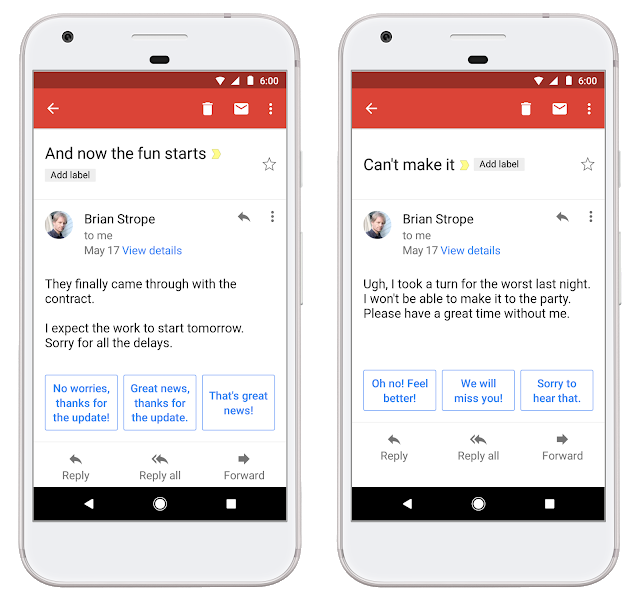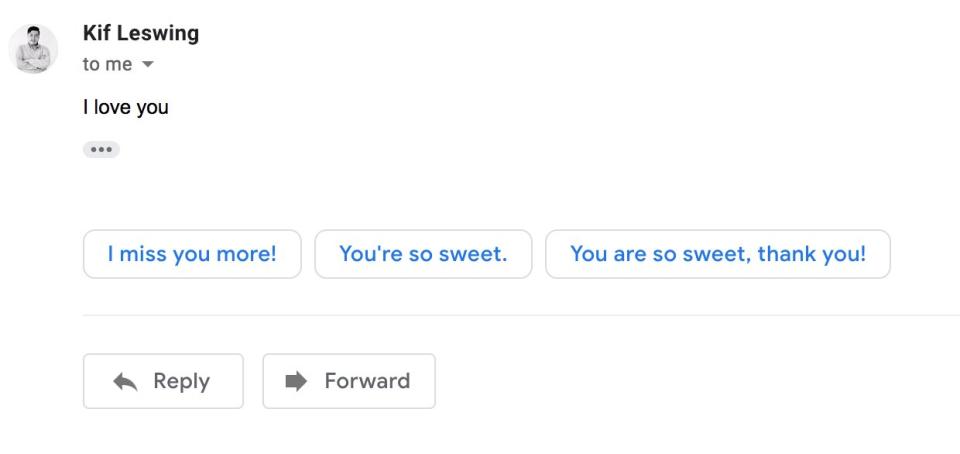Google had to change Gmail's new Smart Reply responses because its AI kept suggesting 'I love you' (GOOG, GOOGL)

Shutterstock
Gmail's "Smart Reply" feature suggests quick responses at the bottom of emails.
"I love you" was often a suggested reply until Google changed it in testing. Another common early suggestion was "Sent from my iPhone."
The current version of Smart Reply doesn't often suggest these responses.
A few days ago, I received a short, effective email in my inbox: "Sounds good!"
I had to pause. Although that was the response I wanted — I was arranging a meeting — I wondered: Did he really send that, or did he simply hit Google's automated response suggestions at the bottom?
In recent weeks, Gmail's "Smart Reply" feature has been released to an ever-rising amount of the web email service's over 1.4 billion users, meaning that soon a large percentage of the world's population will get access to Google's cheery, direct suggestions when it becomes a default feature next month.
The actual language of the suggestions is created with machine learning, a family of technologies that is sometimes called artificial intelligence in the non-technical world.

Google's software crawls billions of emails on Gmail, and then uses software to suggest phrases drawn from that database that you might want to use to confirm a coffee at 4 PM at Blue Bottle. 10% of responses are generated through the Smart Reply feature, according to The Wall Street Journal.
But it hasn't always worked well enough — a director of product management at Google, Ajit Varma, shared some funny early bugs with the Journal.
From the story:
Google said an early prototype of the feature had “a propensity to respond with ‘I love you’ to seemingly anything,” forcing it to tweak the algorithm. “You don’t want to respond that to your boss,” Mr. Varma said.
Imagine trying to organize a conference call with a client and accidentally sending "I love you."
Another funny suggestion the software kept repeating is a nod to Google's neighbors in Silicon Valley, Apple. Apparently, the software thought "Sent from my iPhone" was a good way to respond to emails.
That's the default signature on the default email app on iPhones, so it shows up all the time in Google's data. And Google's machine learning software, as smart as it was, isn't actually a human, so it didn't realize that was a clever bit of branding, and not any kind of useful information.
Same with "I love you" — while Smart Reply is impressive, it doesn't understand social context yet.
But the software does learn: Google says that as you use it more, the style and tone will become more personalized to you.
Sounds good!

Kif Leswing
NOW WATCH: The Samsung Galaxy Note 9 is a $1,000 phone that's actually worth it
See Also:

 Yahoo Finance
Yahoo Finance 
